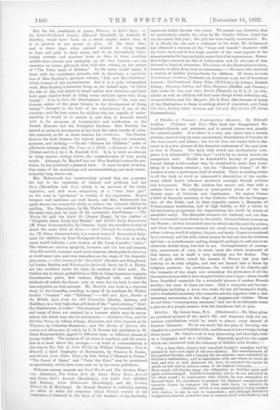A Paladin of Finance : Contemporary Manners. By Edward
Jenkins. (Triibner and Co.)—This book has disappointed Mr. Jenkins's friends and admirers, and it cannot please very greatly' the general public. It is clever in a way-, and opens with a certain promise, marred only by some unnecessary descriptions of females of the denti-monde and others ; but for all that, the reader fails to dies cover in it a true picture of the financial excitement of the past year or two in France. The book with which one involuntarily com- pares it is Ainsworth's "John Law," and it by no means stands the comparison well. Feeble as Ainsworth's faculty of presenting human beings to his readers was, he contrived to make Law some- thing of a human creature ; but the "Monsieur Cosine of Mr" Jenkins is only a portentous kind of shadow. There is nothing either in all the book BO vivid as Ainsworth's description of the excite- ment which Law's schemes produced amongst French noblesse and bourgeoisie. What Mr. Jenkins has seized, and that with a certain force, is the religious or quasi-pietist phase of the late Bourse orgie of Clericals and Legitimists. He makes Cosmo a kind of financial emissary of the Catholic Office for the Propaga- tion of the Faith, and in that capacity causes a Marquise of Ultramontane tendencies, and of high family, to fall a victim to his fascinating programme for regenerating the world by means a sanctified usury. The Marquise ensnares her husband, and her hus- band's honoured name draws in the public. Success follows success on the Bourse ; all that is touched turns to what looks like gold for a time, and when the goal seems reached, the crash comes, leaving dust and ashes, a strong smell of sulphur, despair, and death. Cosmo is murdered by a concierge and his wife, whose money he had put into his schemes and lost,—a melodramatic ending, designed, perhaps, to add zest to an otherwise dullish story, but bad in art. Incompleteness of conceps tion, narrowness of view, in short, mark the whole treatment of this theme, not in itself a very enticing one for fiction. The last of gain which seized the masses in France last year had - nothing to do with religion, and was not fanned into a flame by religious passions. Its sordidness, the variety of its objects, and the intensity of the single aim animating the promoters of all the thousand schemes which were dangled before mon's eyes,—these would have furnished materials for a wonderful picture of modern French, society ; but none of these are here. Only a marquise and her sun. soundings, including a lover who waits for her old husband's death, and a wonderful secretary who commits suicide, together with a few- necessary accessories, in the shape of puppets and victims. These do not form "contemporary manners," and are in no adequate sense a picture of a people smitten with the inordinate lust of gain.


































 Previous page
Previous page